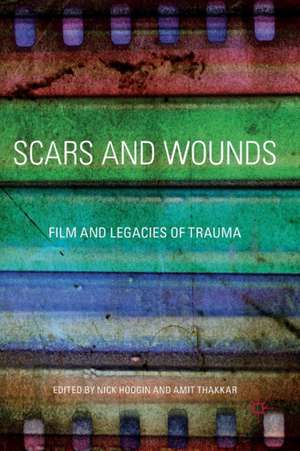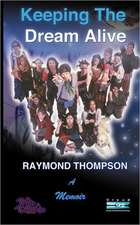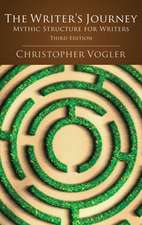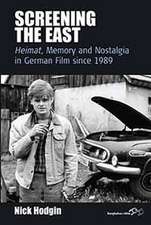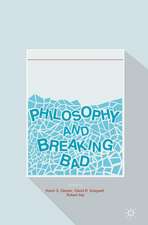Scars and Wounds: Film and Legacies of Trauma
Editat de Nick Hodgin, Amit Thakkaren Limba Engleză Paperback – 8 aug 2018
| Toate formatele și edițiile | Preț | Express |
|---|---|---|
| Paperback (1) | 781.94 lei 43-57 zile | |
| Springer International Publishing – 8 aug 2018 | 781.94 lei 43-57 zile | |
| Hardback (1) | 789.35 lei 43-57 zile | |
| Springer International Publishing – 29 iun 2017 | 789.35 lei 43-57 zile |
Preț: 781.94 lei
Preț vechi: 953.58 lei
-18% Nou
Puncte Express: 1173
Preț estimativ în valută:
149.62€ • 156.64$ • 123.80£
149.62€ • 156.64$ • 123.80£
Carte tipărită la comandă
Livrare economică 07-21 aprilie
Preluare comenzi: 021 569.72.76
Specificații
ISBN-13: 9783319822440
ISBN-10: 3319822446
Pagini: 299
Ilustrații: XII, 299 p. 20 illus., 17 illus. in color.
Dimensiuni: 148 x 210 mm
Greutate: 0.44 kg
Ediția:Softcover reprint of the original 1st ed. 2017
Editura: Springer International Publishing
Colecția Palgrave Macmillan
Locul publicării:Cham, Switzerland
ISBN-10: 3319822446
Pagini: 299
Ilustrații: XII, 299 p. 20 illus., 17 illus. in color.
Dimensiuni: 148 x 210 mm
Greutate: 0.44 kg
Ediția:Softcover reprint of the original 1st ed. 2017
Editura: Springer International Publishing
Colecția Palgrave Macmillan
Locul publicării:Cham, Switzerland
Cuprins
Introduction: Trauma Studies and the Scar Motif.Nick Hodgin and Amit Thakkar.-1. Trauma in Recent Algerian documentary Cinema: stories of civil conflict told by the living dead.Guy Austin.-2. Elusive Figures: Children’s Trauma and Bosnian War Cinema.Dijana Jelaca.-3. Conferring Visibility on Trauma within Rwanda’s National Reconciliation: Kivu Ruhorahoza’s Disturbing and Salutary Camera.Alexandre Dauge-Roth.-4. Proximity and distance: approaching trauma in Katrina films.Nick Hodgin.-5. Our Long National Nightmare Is Over’: the resolution of trauma and male melodrama in The Tree of Life (Terrence Malick, 2011).Brian Baker.-6. Listening to the Pain of Others: Isabel Coixet’s The Secret Life of Words (2005).Erin K. Hogan.-7. Australian Postcolonial Trauma and Silences in Samson and Delilah (Warwick Thornton, 2009).Ben Gook.-8. Trauma’s slow onslaught: Sound and Silence in Lav Diaz’s Florentina Hubaldo, CTE (2012).Nadin Mai.-9. Flesh and Blood in the
Globalized Age: Pablo Trapero’s Nacido y criado/Born and Bred (2006) and Carancho/The Vulture (2010).Fiona Clancy.-10. Unclaimed Experience and the Implicated Subject in Pablo Larraín’s Post Mortem.Amit Thakkar.-11. Persepolis (Vincent Paronnaud and Marjane Satrapi, 2007) telling tales of trauma.Steven Allen
Globalized Age: Pablo Trapero’s Nacido y criado/Born and Bred (2006) and Carancho/The Vulture (2010).Fiona Clancy.-10. Unclaimed Experience and the Implicated Subject in Pablo Larraín’s Post Mortem.Amit Thakkar.-11. Persepolis (Vincent Paronnaud and Marjane Satrapi, 2007) telling tales of trauma.Steven Allen
Notă biografică
Nick Hodgin is Lecturer in German at the University of Sheffield, UK. He has published widely on German cinema including Screening the East: Heimat, Memory and Nostalgia in German Cinema (2011) and the co-edited volume, The GDR Remembered(2011), as well as on international film, documentary film, and cultural studies.
Amit Thakkar is Senior Lecturer in Hispanic Studies at Lancaster University, UK. He has co-edited special issues of journals on masculinities and violence in Latin America, one of which was selected for Routledge’s Special Issues as Books series. He has also published articles on crash cinemas in Latin American film.
Textul de pe ultima copertă
This book examines recent cinematic representations of the traumatic legacies of national and international events and processes. Whilst not ignoring European and Hollywood cinema, it includes studies of films about countries which have been less well-represented in cinematic trauma studies, including Australia, Rwanda, Chile and Iran. Each essay establishes national and international contexts that are relevant to the films considered. All essays also deal with form, whether this means the use of specific techniques to represent certain aspects of trauma or challenges to certain genre conventions to make them more adaptable to the traumatic legacies addressed by directors. The editors argue that the healing processes associated with such legacies can helpfully be studied through the idiom of ‘scar-formation’ rather than event-centred ‘wound-creation’.
Caracteristici
Collates and examines recent cinematic representations of trauma Features fresh approaches to films focusing on scars rather than wounds Considers a gamut of cinematic approaches including slow cinema, animation, documentary, melodrama, oneirism, allegory, silence and vococentrism
